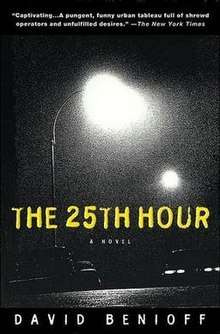The 25th Hour
The 25th Hour is the 2001 debut novel by David Benioff. A film adaptation, for which Benioff wrote the screenplay, was directed by Spike Lee and released in 2002.
 | |
| Author | David Benioff |
|---|---|
| Country | United States |
| Language | English |
| Published | 2001 (Carroll & Graf Publishers) |
| Media type | Print (hardback & paperback) |
| Pages | 224 pp |
| ISBN | 0-7867-0772-0 |
| OCLC | 45482019 |
| 813/.6 21 | |
| LC Class | PS3552.E54425 A614 2000 |
Background
The idea for the book came when Benioff returned home to New York for Passover while he was away working in Wyoming. He suffered from appendicitis and had to undergo emergency surgery. Benioff said: "Walking the halls of Mount Sinai afterward, seeing people walking up 5th Avenue and Central Park and trapped in the hospital, I had a sense of being so close to the city and not being a part of it." He continued: "I thought, 'What if you are not stuck for five days, but seven years?' And that is writing what you don't know. Taking a banal problem and making it much more serious."[1]
Benioff spent two years writing the novel, and completed the book as his thesis for a Master of Fine Arts degree in creative writing at the University of California Irvine in 1999.[2][3][4] The book was originally titled Fireman Down, but was changed to The 25th Hour on the advice of the publisher who accepted the book with a $7,500 advance.[3][5] The book was published in 2001.
He was asked to adapt the book into a screenplay by Tobey Maguire, who had read a preliminary trade copy and became interested in making a film of the book.[6] It was filmed as 25th Hour, starring Edward Norton and directed by Spike Lee.[5][7]
Plot
New York drug dealer Monty Brogan is arrested for drug possession with intent to sell, and sentenced to seven years in prison. He spends his last night of freedom with two friends, contemplating his uncertain future and the decisions he made that brought him to this point.[1]
Reception
Publishers Weekly said The 25th Hour was "brilliantly conceived, this gripping crime drama boasts dead-on dialogue, chiaroscuro portraits of New York's social strata and an inescapable crescendo of tension."[8] Bookseller said that it had "powerful characterization and dialogue."[9] Entertainment Weekly rated it an A-minus, saying that Benioff "shows a knack for critiquing his genre while revitalizing its cliches" and the novel "achieves both pathos and excitement."[10]
References
- Jalon, Allan M. (May 13, 2001). "How to Write a Powerful First Novel in a Bland Age". Los Angeles Times.
- "Crowning achievement". UCI News. August 12, 2014.
- Gottlieb, Jeff (December 2, 2002). "His Finest Hour". Los Angeles Times.
- Jordan, Gregory (May 17, 2003). "You'll Have to Hold the Line, Mom, My Agent Is Calling". The New York Times.
- Benioff, David (May 3, 2003). "One more hour". The Guardian.
- Katie Kilkenny (May 12, 2011). "Benioff '92 embraces storytelling in 'surreal' career". The Dartmouth.
- "Q: What do Brad Pitt, Spike Lee and the Iliad have in common? A: David Benioff, Hollywood's latest wonder kid". Herald Scotland. March 29, 2003.
- "THE 25TH HOUR (Book Review)". Publishers Weekly. 247 (47): 46. November 20, 2000. ISSN 0000-0019.
- Page, Benedicte (March 15, 2002). "Last day of freedom". Bookseller (5017): 34. ISSN 0006-7539.
- Tucker, Ken (January 26, 2001). "EDITOR'S CHOICE". Entertainment Weekly (579/580): 97. ISSN 1049-0434.